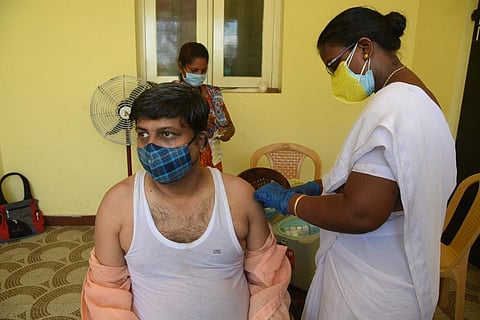

CHENNAI: Chennai’s daily test positive rate of Covid-19 has declined from 26% on May 10 to 21.1% on May 16. This shows that about 21 out of 100 people tested are now becoming positive.
While the city conducted close to 30,000 tests daily during the period, the daily cases too reduced from 7,149 on May 10 to 6,150 on May 17. This indicates that the spread in the city is gradually on a decline.
Public health experts say that lockdown alone is not a reason. “Not just lockdown but the vaccination drive too could have caused the decline,” says former Director of Public Health Dr. K Kolandasamy.
He said that since there has been a massive rise in infection, it may also have brought in immunity among some sections, while the simultaneous vaccine coverage too may have helped in stopping the massive spike.
Virologist Dr. Jacob John says that the lockdown effect will be seen after two weeks. “This decline may be due to the natural tendency of the virus too. If there is a continuous decline further, in the coming days, then it may be a clear indicator of control measures showing a result,” he says.
Dr. John said: “Epidemiologically, there is a decline. This may vary from district to district but overall, the cases may come down in the state soon.”
Chennai’s Covid-19 case growth too has slowed down. From 3.8% case growth on May 10, it has now come down to 1.8%.
Surprisingly, three Corporation zones -- Sholinganallur, Alandur, and Ambattur -- are recording a negative case growth. This means, more people here are getting discharged daily than the number of fresh cases.
‘Need oxygen stretchers, step-down wards’
Meanwhile, to control the spread further, experts suggest the introduction of oxygen stretchers and step-down wards.
“Oxygen cylinders can be fitted beneath a stretcher. This can help patients waiting in ambulances for admission and by putting the patient on an oxygen stretcher, the ambulances too can go back to ferry other patients,” says Dr. Kolandasamy.
He said that for a hospital with 1000 beds, at least 50 oxygen stretchers can be placed so that patients may continue the oxygen support while they wait for beds.
Apart from this, Dr. Kolandasamy also suggests hospitals set up a step-down ward. “Here, hospitals can have oxygen concentrator supported beds. This will be sufficient for severe patients recovering from Covid and will help to free up tertiary hospitals too,” he said.
Dr. Kolandasamy added that there could be at least 200 beds in step-down wards which may de-stress the hospital from overburden and also help in treating more severe patients needing attention.